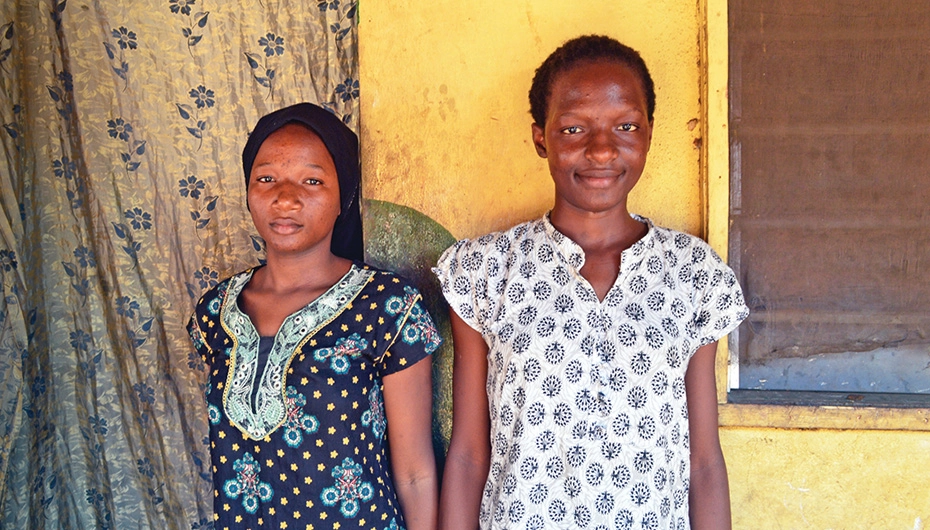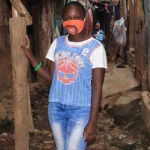Media Centre - Media release - 9 September 2020
Girls with disabilities profoundly impacted by COVID-19 emergency worldwide, reports Plan International Australia

A new report by the charity for girls’ equality – Plan International Australia – shines a light on the profound impact the pandemic is having on girls and young women with disabilities.
The Leaving No Girl Behind report found girls and young women with disabilities, particularly in the world’s poorest countries, have a far higher risk of contracting COVID-19, on top of an increased risk of violence, unemployment, disruption to learning and a multitude of issues.
Susanne Legena, Plan International CEO, said the pandemic has created a ‘distressing situation’ for millions of people living with a disability, and of those, girls are the most at risk.
“Social distancing is impossible for many who rely on carers. We also know that there have been serious issues buying face masks and accessing hand-washing facilities and soap to avoid the spread of this devastating virus.
“Sadly those who have underlying health conditions are also more susceptible to becoming seriously ill or dying from COVID-19.
“This important report provides evidence of the urgent need to act now to ensure girls and young women with disabilities are not left behind. There is still time to put measures in place to protect them and to dismantle the many barriers they face as we look towards rebuilding our world post-COVID-19.”
Plan International Australia has today launched an urgent fundraising appeal to support girls with disabilities through the pandemic and beyond (see: https://www.plan.org.au/give/appeals/bright-future).
In Australia, the Disability Royal Commission recently heard people with disabilities have suffered higher rates of domestic and family violence, are experiencing suicidal thoughts, and felt “expendable” during the COVID-19 pandemic. There have also been multiple outbreaks of the virus in residential disability accommodation, including 34 active cases in Melbourne as of September 3.
“This awful situation we’re seeing in disability care here at home is amplified for girls in developing countries who are living in extreme poverty,” Ms Legena said.
“In the countries where Plan International works, we are especially worried about a sharp rise in violence. Internationally, girls and young women with disabilities face up to 10 times more violence than women and girls without disabilities and the pandemic has only made this worse.
“Stay-at-home orders and the restrictions placed on visitors in disability care make girls and young women in these communities acutely vulnerable to violence, abuse and sexual exploitation during the pandemic.
“We know that in some countries, existing stigma and discrimination against girls and young women with disabilities has been intensified by COVID-19, because suspicion and fear is directed towards them due to false beliefs that they carry the virus. This also increases the risk of violence and abuse.”
The pandemic has also posed a major disruption to education. An estimated 60% students globally continue to be out of school due to country-wide closures in 106 countries. Girls and young women with disabilities already experienced significant barriers to accessing education prior to the pandemic, with some estimates that only 1-2% of girls with disabilities in developing nations are literate.
Girls with complex learning needs, or those in poorer households and in remote regions are not able to access online lessons due to lack of access to the internet. Girls with disabilities may also rely on teacher aids, basic education support and assistive technology that is only available at school.
In many of the countries that Plan International works in, social support is not available to supplement lost income, placing girls and young women at risk of extreme poverty. Only 28% of people with significant disabilities can access disability benefits globally, and only 1% in low-income countries.
Other issues they face include problems accessing menstrual hygiene products and soap and lack of access to health services to manage pre-existing conditions.
Plan International Australia is calling on governments to implement measures to urgently address the deteriorating situation for girls and young women with disabilities.
These include:
- Ensuring access to remote education and learning and prioritising a return to learning for girls with disabilities.
- Ensuring lockdowns and stay-at-home orders specifically allow for people to leave their homes to escape violence and hotlines, protection services, justice services and gender-based violence programs are inclusive and accessible.
- Donors, governments and humanitarian agencies must place girls and young women with disabilities at the centre of all health related prevention.
- Provision of essential services to reach all girls and women in the most affected communities, including maternal and young child health, sexual and reproductive health information and services, clean water and safe sanitation, and accessible information about the pandemic. These vital services should be free to access and use.
- Support girls and young women with disabilities to return to work and where girls and young women cannot return to their previous role, offer alternative employment opportunities.
- Urgently provide new funding to save lives and livelihoods among hard-hit populations, including refugees.
About Plan International Australia
Put simply, we’re the charity for girls’ equality. We tackle the root causes of poverty, support communities through crisis, campaign for gender equality, and help governments do what’s right for children and particularly for girls. We believe a better world is possible. An equal world; a world where all children can live happy and healthy lives, and where girls can take their rightful place as equals.
Media contacts


